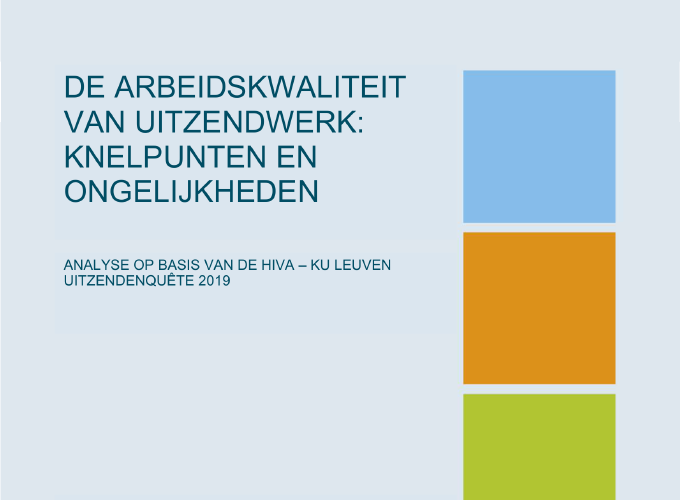Abstract
This report discusses the quality of work of temporary agency workers in Belgium, based on a large (N = 6.088) and matched survey of both agency and non-agency workers. As a follow-up to the previous, more general descriptive HIVA – KU Leuven report in 2014, this report specifically focused on bottlenecks and issues for those who (risk) staying longer in agency work. As dimensions of quality of work, we discuss (1) terms of employment, (2) work content, (3) working conditions, and (4) labour relations. In the area of terms of employment we focus on (inequalities in) wages and the quantity and quality of training. Task autonomy and control over working time are discussed as aspects of work content. With regard to working conditions, the emphasis is on (the degree of information on) safety and health at work. Finally, with regard to labour relations, we look at the degree of employee participation, in addition to the relationship with manager(s), colleagues, and the trade union. Based on the survey results and analysis, main conclusions w.r.t. bottlenecks and issues, are that agency work is strongly driven by extrinsic motivations, it has a lower quality of work than regular, permanent work, it reinforces (cumulative) processes of labour market inequality, and local trade union presence can mitigate negative effects of agency work to some degree.
The following report summaries are also available:
- Dutch report summary, 9p: “De arbeidskwaliteit van uitzendwerk: knelpunten en ongelijkheden”.
- French report summary, 9p: “La qualité du travail intérimaire: obstacles et inégalités”.
This research was funded through, and carried out in collaboration with, ACV-CSC.
Coverage / science outreach
- VRT Radio 1, De Ochtend (2020-03-12): “Uitzendarbeid is vaak geen vrije keuze”.
- De Morgen (2020-03-12, p. 10), “Uitzendwerk vergroot kloof op arbeidsmarkt”.
- La Dernière Heure (2020-03-12, p. 16): “Les intérimaires davantage touchés par les inégalités et la précarité”.
- De Standaard (2020-03-13, p. 23): “Twee op drie uitzendkrachten willen vaste baan”.
- NextConomy.be (2020-04-28): “Vraag- en uitroeptekens bij uitzendwerk”.
- De Morgen (2020-05-10, p. 10): “Tijdelijk statuut leidt to misbruiken”.
- Persbericht KU Leuven (2020-03-12): “Uitzendwerk versterkt de ongelijkheid op de arbeidsmarkt”.
- Hermans, M. & Lenaerts, K. (2020). De stem van de uitzendwerker. Samenleving & Politiek, jaargang 27, nr. 4 (april), pp. 40-44.
- Hermans, M. & Lenaerts, K. (2020). Wie gaat een bank vooruit? Opleiding, vakbonden en cumulatieve ongelijkheid in uitzendwerk. Over.Werk, jaargang 2020, nr. 1 (juni), pp. 150-156.
- Vakbeweging (2020). “Uitzendwerk zelden een vrije keuze”. jaargang 2020, nr. 921, pp. 14 - 14.
- Visie (2020). “4 op de 10 uitzendkrachten komt moeilijk rond”. jaargang 76, nr. 4, pp. 1 - 9.
